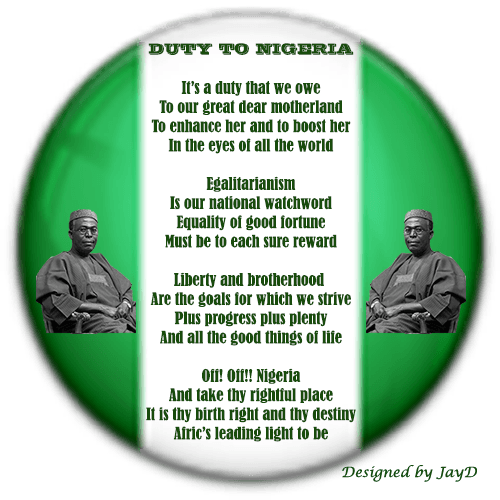Democracy & Governance
Rebuilding Nigeria -By Joshua Bamidele


We shall complain, appeal and arraign. We will make the world listen to the facts of our condition. We will fight in every way we can for freedom, democracy and social betterment. –MAIN RESOLUTION OF THE 5TH PAN-AFRICAN CONGRESS
To serve with might and strength, defending her unity and upholding her honor and glory is the duty of every citizen to our fatherland, a country defined in her flag as home of peace and agriculture, the most populous black nation in the world; Nigeria.
The Federal Republic of Nigeria comprising of 36 states and the federal capital territory, Abuja is a nation that accommodates diverse cultures, societal norms, traditions, religions, ethnicities, languages and ideologies. It is a community with peoples. The country has also been identified as a regional power, also having regional hegemony and major influence within its region.
Understanding Nigeria in terms of her name, image, challenges and respective solutions may not be realistic without the appraisal of her genesis.
In 1900, Britain officially assumed responsibility of the whole of Nigeria after a trade of the territory with the Niger Company and then gradually over the years, British protectorates were established throughout the territory. However, in 1914, the protectorates were amalgamated into one Nigeria.
It should thus be established that the British didn’t travel all the way across the world just to spread democracy, Nigeria started off as a business deal for them, between a company and a government. While most countries are born out of shared ideals and common identities, Nigeria was simply created to fulfill a business requirement; that of supplying goods and services to Great Britain. This reveals that the nation was not built to effectively make the essence of democracy and other true ideals and fruits of the supposed colonization become operable in the territory.
As much as Nigeria’s independence was not freely given, the colonial masters were tactful enough to shape the process into one in which Britain was to define the tune that Nigeria’s overall system was to dance to; one in which there will still exist colony in perpetuity after freedom from colony.
The structure and strength of her name and strife for independence from her 60 years of colonialism (1900-1960) was much enough for the built hopes of many on Nigeria to become the foremost Negroid state of economy. Notwithstanding, the systemic non-functionality and imbalance in the nation bore out from her chronicled genesis serves largely as a challenge which envelopes a network for glitch in the nation.
By an act of the British parliament, Nigeria became an independent nation on 1st October 1960.
Nigeria has since then been wracked by periodic violent clashes between socio-political, ethnic and religious groups as well as corruption and other vices that have contributed to the web and chain collapse of the state by inflicting malfunctions on security, health, agriculture, education, economy and other sectors of the nation. These cannot be alienated from the socio-cultural, socio-economic and socio-political system that greeted the country at her independence. This seemed like a script from the colonial masters to define the shape of the societal class in the nation.
In proffering the most practicable solution, the study of the causal effects of the challenges facing the nation as explicated so far in employing the ideal and ultimate intents and motives of all activities that structured the nation sequentially and chronologically.
The resolution of the 5th Pan-African Congress which addressed the clamour for independence of African countries from colonialism resolved that there should be a sustained strife in making the world hear our clamour for freedom, democracy and social betterment. It should thus be emphasized that all countrymen are needed for the building and rebuilding of Nigeria. The development of all sectors of the nation in an equitable approach will help make the upholding of the image of the nation an all-inclusive endeavor.
To achieve this, there must be incessant public enlightenment and awakening of the citizens in upholding the spirit of progress in the society in abiding by the words of the national anthem and pledge. This must be sustained by exemplary and effective leadership making policies that reflect fairness, justice and sanity of the system.
Advocacy for true democracy must be in top gear in credibly electing leaders whose government will be of the people, for the people and by the people.
Your country needs you for the rebuilding of your shattered homeland. Your homeland ruined by exploitation. By the tyrants of foreign nations




















